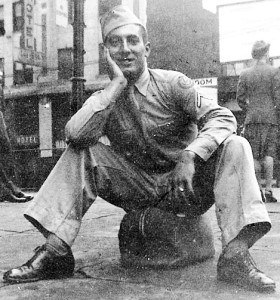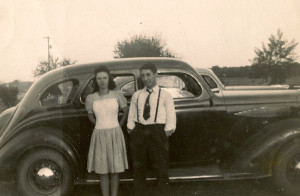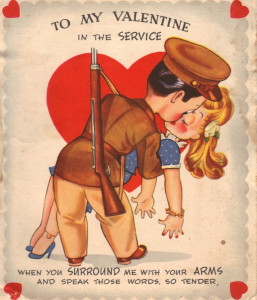By Susan Bromley
Staff Writer
Brandon Twp.- “I’m saving all of your letters. I don’t know what to d

furlough at Union Depot, Detroit.
o when I get a locker full. Do you suppose you could keep them for me when I get 20 or 25 if I wrap them carefully in a package and send them to you? I’d like to keep every one and you do the same then we’ll pull them out and read them over every so often for the next 50 years, okay?”
Aarol “Bud” Irish successfully struck a deal with Elaine M. Corbat, to whom the Army soldier wrote the above letter on Dec. 12, 1942. He would marry her in 1946 after returning home from World War II, and 60 years later, just a month after his death, Teresa Irish would open her father’s Army trunk and find nearly 1,000 handwritten letters.
A third of that wartime correspondence to Elaine and Bud’s family, as well as photographs from his service, comprises Teresa’s book, “A Thousand Letters Home.” She will present “The Journey of the Letters” from 7-8:30 p.m., May 24, at the library, 304 South St. “This was not my intended journey, but it’s quite a treasure trove,” said Teresa. “I can’t put into words how powerful the letters are because they are in real time… My dad would always talk about the war on particular anniversaries. He would talk of
Christmas Eve in Germany in 1944 or April 9, 1945, when he went out on a recon

naissance mission and five of his buddies died and my dad was the only one that walked away without a long-term injury. He would recollect these things and you would think you heard it, but I didn’t know I only knew one percent of the stories until I read the letters.”
Bud Irish was a 20-year-old Hemlock, Mich. dairy farmer who could have opted to take a deferment as the only son of parents who also had four daughters, but instead, he volunteered for military service ahead of the draft and entered the Army in September 1942. He wrote his first letter from boot camp at Ft. Custer, Mich. and kept on writing to his parents and sisters, but especially to his sweetheart Elaine, whom he’d fallen in love with at first sight at a dance hall social two years earlier, and to whom he proposed marriage before he left to serve in World War II.
“He was quite a romantic,” said Teresa.
The letters are a testament to his love.
“Did you see the moon come up last nite? I’m hoping you did and were gazing at it as I was. It was about as beautiful as I ever saw. It was a deep orange color and just seemed to blend into the dark sky. I told Corporal Clay it was sure too bad that a moon like that was going to waste for so many fellows and their sweethearts just because a few big fellows were greedy for power or land, but I guess it just has to be that way. The way the war looks now we’re going to have a long time of waiting, Honey, but it will be well worth it. If praying helps any, the time sure ought to shorten up some.” – written to Elaine from Camp Maxey, Texas, March 23, 1943.
Teresa had always known her father as a loving, optimistic man, devoted to his family, but it wasn’t until Memorial Day weekend 2006 that she would discover this tribute and many more like it, as well as heartbreaking descriptions of war, in a trunk in her parents’ Saginaw home. Bud had died a month before, and it was nearly midnight when Teresa, seeking to come to terms with his death, sat in front of the trunk, ope

ned it, and was transported back in time to rediscover and be inspired yet again by her father.
“We’ll hope and pray all of us fellows will be back in another year. The war news sounds good, but it’s going to be some tough going yet. Maybe it will be a lot better world after it’s all over and everyone will appreciate more how much God has given them.” – written to Elaine’s dad from Camp Swift, Texas, June 14, 1944.
Teresa and her siblings had always offered to come back home and go through the trunk with him, and he would tell them, “Someday.” She knows that over the years, including the summer before he died, he had revisited the contents of the trunk, which included 250 photos in an album, a Luger pistol, German sabers, memorabilia including USO programs featuring Bob Hope and Martha Tilton, and 30 bundles of letters postmarked between November 1942 and December 1945, all in their original envelopes. She had wanted to have “a good cry” and that night she did, staying up all night to read, but not even making a dent in the letters by the time her mother returned and they went to a Memorial Day service together.
It would take Teresa 13 months to read all the letters, the sheer volume daunting as she pored over her father’s beautiful handwriting on thin, half-century-old paper. She sorted them into yes, no and maybe piles as she began to formulate a plan to compile them into a book. She would call her sisters and cry and share what she’d read.
“…I can’t mention the name of the city I saw at the present time, but I can tell you a little about it. In places the houses were pulverized to dust and great steel framed factories and buildings were nothing but masses of twisted waste. Parts of the city and even small towns were left untouched, but on roads where the Germans put up a fight and withdrew slowly, there was nothing but a path of destruction. A person can’t realize the damage done by war ‘til he sees it in person…I’ve seen hundreds of French people now and they seem to welcome the Americans, but pay little attention to the constant travel of army vehicles. I imagine the continuous movement of Germans and then American soldiers since 1939 has made them quite used to warfare and traffic. They make their way along the main highway as bravely as if they were riding in behind the protecting steel of 30 ton tanks instead of walking and riding on their bicycles. I imagine they look at the wreckage and ruin and think back to beautiful homes and the peace they once had. It’s too bad some of the people back in the states couldn’t see it and maybe they’d realize how lucky they really are. There’s many a fellow over in this country tonite who would give everything they had to be back home tonite.” – written to Elaine from France, Oct. 2, 1944.
One of the most common questions Teresa is asked by historians is whether her father’s letters were censored. She said only about six phrases from among the thousand letters were redacted. Bud had been very conscious of his communications, sometimes delaying information.
Two of Teresa’s sisters assisted in typing the letters that were to go into the book and five-and-a-half years after she had first sat down and started reading the letters, Teresa self-published 320 of them, along with 104 corresponding photographs, in “A Thousand Letters Home.”
“If anyone ever believed in miracles I certainly do now…We had to jump from our jeep when the Germans started shooting with everything they had…The fellows with armored cars did all they could to get us under cover, but no one could move an inch from cover without getting it. My buddy and I laid behind the rocks while bullets hit so close that pieces of stone would hit us and a small piece even hit my cheek. There aren’t words to say how scared we were and how hard we prayed…When our fellows were forced to move back for more cover, their German S.S. troopers came down the road and there were so many we didn’t have a chance. One saw us and from a distance of not over ten feet, he sprayed us with a gun similar to our tommies. My buddy was between him and me and was lying so close that I could feel the bullets hit him…I dropped on my face and laid there to make them think I was dead and one of them jerked the rifle from my hands and hit us both over the head…About a half hour later I heard them coming back and my heart was beating so hard it seemed like they should have heard it…After that I laid there for almost two hours thinking there was no one left and that my only chance was to wait ‘til dark. It was like waiting a million years…I can’t explain it, but when you know that because someone else took all the bullets that might otherwise have gotten you, a person feels he just can never do enough to make up for them.” – written to Bud’s family from Germany, April 12, 1945
As Teresa sees it, there are three main components to the letters, as well as the entire book.
“The first is it’s a real firsthand look into a soldier’s experience of World War II,” she said. “Secondly, it’s a beautiful love story, of which promise and hopefulness serves as a compass to bring one home even through despair. Third, it’s a story of faith, a staple in his life that helped get him through. It’s a book of history, love, and faith. All those are very prevalent throughout the letters, from beginning to end.”
Attendees of the program, she adds, will share laughter, tears, and music and leave with a sense of community.
“It was sure a big disappointment not to be going home right away like we’d planned. I hate to think of you folks sitting tonite and thinking of seeing me in less than four weeks, especially when even before you get this letter you’ll have one saying I don’t know when I’ll be home. I was in a pretty low mood, but when a fellow stops and thinks it over, he shouldn’t kick as there are thousands of people worse off than us. Think of all the fellows who went home wounded, or of families who had loved ones killed and can’t even look forward to their ever coming home…” – written to Bud’s family from Bayreuth, Germany, Oct. 13, 1945
Bud Irish made it home in January 1946, to marry his sweetheart and raise with her their 10 children, including Teresa Irish, who will speak about her father and share his letters May 24. To register for the free program, go to www.brandonlibrary.org or call 248-627-1461. For more information on the book or to order, visit www.athousandlettershome.com
